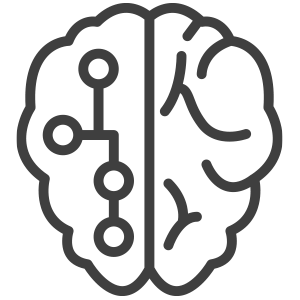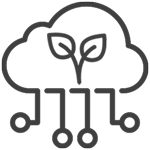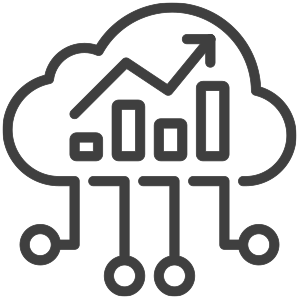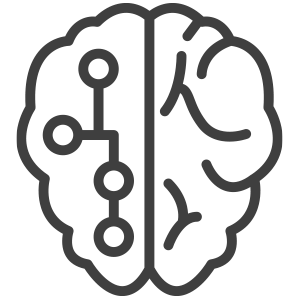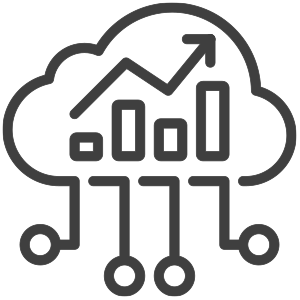Shape Digital Change
Become Part of the Megatrend
There are two megatrends in the broad field of digitalisation: artificial intelligence and the security of digital systems. Courses in computer science offer great potential on the future job market, e.g. to contain potential dangers arising from the use of digital processes, as in the "Cyber Security" course of study, or a Bachelor's degree with the title "Artificial Intelligence", which stands out among German courses of study. But even with tried and tested courses of study such as Applied Computer Science, Business Informatics or Internet of Things, students can choose from countless career opportunities and help shape digital change.
Prof. Dr. Andreas Berl, Dean of the Faculty of Applied Computer Science
Please note: programmes with an EN side tab are completely instructed in English.
Bachelor.
Master.
events
the faculty at a glance
science labs
Staff in our workshops and science labs are enthusiastic about what they do and are passionate about technology, true to the principle: "If you want to build a ship, don't drum up men to get wood, assign tasks and divide the work, but teach them to crave for the wide, endless sea." (Antoine de Saint-Exupéry)
Currently, this content is available only in German. We apologize for the inconvenience.
positions
Dean
Vice Dean
Dean of Studies
Women's Representative
Programme coordinators
- Applied Computer Science/Infotronics (Bachelor): Prof. Dr.-Ing. Terezia Toth
- Applied Computer Science/Infotronics (Master): Prof. Dr. Peter Faber
- Artificial Intelligence (Bachelor): Prof. Dr.-Ing. Udo Garmann
- Artificial Intelligence and Data Science (Master): Prof. Dr. Andreas Berl
- Automotive Software Engineering (Master): Prof. Dr.-Ing. Andreas Grzemba
- Bioinformatics (Bachelor): Prof. Dr. Melanie Kappelmann-Fenzl
- Business Informatics (Bachelor): Prof. Dr. Thorsten Matje
- Business Informatics (Master): Prof. Bernhard Zeller
- Business Informatics (Bachelor) part-time - focus on Data Science: Prof. Dr. Stephan Scheuerer
- Cyber Security (Bachelor): Prof. Dr. Martin Schramm
- Cyber Security (Master) part-time: Prof. Dr. Andreas Grzemba
- Entrepreneurial Game Development (Master): Prof. Dr. rer. nat. Goetz Winterfeldt
- High Performance Computing / Quantum Computing (Master): Prof. Dr. Helena Liebelt
- Interactive Systems / Internet of Things (Bachelor): Prof. Dr.-Ing. Marcus Barkowsky
- Life Science Informatics (Master): Prof. Dr. Melanie Kappelmann-Fenzl
- Software-Design (Bachelor): Prof. Dr. Andreas Wölfl
Study advisor
- Applied Computer Science (Bachelor): Prof. Dr.-Ing. Terezia Toth
- Applied Computer Science (Master): Prof. Dr. Peter Faber
- Artifical Intelligence (Bachelor, Geman): Prof. Dr. Markus Mayer
- Artificial Intelligence (Bachelor, Englisch): Prof. Dr. Udo Garmann
- Artificial Intelligence and Data Science (Master): Prof. Dr. Andreas Berl
- Bioinformatics (Bachelor): Prof. Dr. Melanie Kappelmann-Fenzl
- Business Informatics (Bachelor): Prof. Dr. Georg Herde
- Business Informatics (Bachelor) - part-time Data Science: Prof. Dr. Stephan Scheuerer
- Business Informatics (Master): Prof. Bernhard Zeller
- Cyber Security (Bachelor): Prof Dr Martin Schramm
- Cyber Security (Master): Prof. Dr. Andreas Grzemba
- High Performance Computing / Quantum Computing (Master): Prof. Dr. Helena Liebelt
- Interactive Systems / Internet of Things (Bachelor): Prof. Dr. Götz Winterfeldt
- Life Science Informatics (Master): Prof. Dr. Melanie Kappelmann-Fenzl
Internship coordination
- Applied Computer Science (Bachelor): Prof. Thomas Limbrunner
- Artificial Intelligence (Bachelor, German): Prof. Dr. Patrick Glauner
- Artificial Intelligence (Bachelor, Englisch): Prof. Dr. Patrick Glauner
- Artificial Intelligence and Data Science (Master): Mrs Marta Vohnoutová
- Bioinformatics: Prof. Dr. Philipp Torkler
- Business Informatics (Bachelor): Prof. Dr. Stephan Scheuerer
- Business Informatics - Focus Data Science (extra-occupational Bachelor): Prof. Dr. Stephan Scheuerer
- Cyber Security (Bachelor): Prof. Dr. Michael Heigl
- Cyber Security (Master) - part-time: Prof. Dr. Andreas Grzemba
- Internet of Things (Bachelor): Prof. Dr. Peter Jüttner
- Life Science Informatics (Master): Prof. Dr. Melanie Kappelmann-Fenzl
- Software-Design (Bachelor): Prof. Dr. Christoph Schober
Advisory Board:
- Florian Baueregger: Head of Project Software Engineering/3TSE Operations, Rohde & Schwarz GmbH & Co. KG
- Pedrag Marković: Cybersecurity Lead, msg systems ag
- Karl Fuchs: Managing director, T.CON GmbH & Co. KG
- Bettina Haas: Cybersecurity Consultant/Projektleitung, Siemens AG
- Dr. Josef Schreiber: Owner, BioVariance GmbH
- Hans-Joachim Köppen: Technical Leader IoT und Industrie 4.0, IBM Watson Center Munich
- Florian Mertl: General Manager Enterprise Architecture, BMW Group
Exam board:
Exam board I: WI-B, BI-B, KI-B, AIN-B, AID-M, LSI-M, WI-M, ASE-M
Exam board II: AI-B, IAS-B, SD-B, CY-B, AI-M, HPC/QC-M, GAM-M, Hochschulzertifikat "Forschungs- und Dissertationskompetenz"
Exam board III: WIDAS-B, WIbb-B, CY-M
Study assistant
- Bioinformatics (Bachelor), Life Science Informatics (Master), High Performance Computing and Quantum Computing (Master), Applied Computer Science (Master): Stefanie Tank
- Cyber Security (Bachelor), Entrepreneurial Game Development (Master): Ursula Schröpf
- Artificial Intelligence (English Bachelor), Artificial Intelligence (German Bachelor), Applied Computer Science (Bachelor), Internet of Things (Bachelor): Linda Wirrer
- Software Design (Bachelor), Artificial Intelligence and Data Science (Master), Automotive Software Engineering (Master): Daniela Koch
- Business Informatics (Bachelor), Business Informatics (Master), Applied Computer Science (Master): Christina Decker
- Business Informatics - Focus on Data Science (extra-occupational Bachelor), Cyber Security (extra-occupational Master): Martina Fischer
Secretariat
Faculty council
Members ex officio
- Prof. Dr. Andreas Berl, Dean
- Prof. Dr.-Ing. Markus Barkowsky, Vice Dean
- Prof. Dr. Thorsten Matje, Dean of Studies
- Prof. Dr.-Ing. Terezia Toth, Commissioner for Equal Opportunities for Women in Science and the Arts
Elected representative of the Professors
- Prof. Dr. Peter Faber
- Prof. Dr. Andreas Fischer
- Prof. Dr. Melanie Kappelmann-Fenzl
- Prof. Dr. Markus Mayer
- Prof. Dr. Michael Scholz
Elected representative of the academic staff
- -
Elected representative of the non-academic staff
Elected representative of the students
- Hr. Julian Burner
- Hr. Alexander Pietruska
news
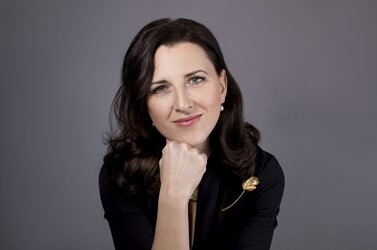
On December 4th the »WomenTech Network« announced the winners for the »Women in Tech Global Awards 2024« at »supercomputing24« in Atlanta, USA. Dr. Helena Liebelt, professor of computer science at the Deggendorf Institute of Technology (DIT) and Technical Program Manager for Quantum Computing at Intel was recognized as one of those winners at the largest virtual awards celebration in technology for women, minorities, and their allies. The »WomenTech Network« is the world's largest community for women in tech with more than 9,500 ambassadors in 179 countries.
This year’s competition featured an extraordinary 1,560 contestants representing 128 countries across 21 diverse categories, showcasing the global influence and reach of the Women in Tech Global Awards. Helena Liebelt won bronze in the category "global technology leadership". Prof. Dr. Helena Liebelt has made significant contributions to the advancement of quantum computing and high-performance computing (HPC). She spearheaded the creation of one of Europe’s first Master’s programs in Quantum Computing and HPC, paving the way for technological progress and equipping the next generation of innovators in this cutting-edge field. Beyond academia, Prof. Liebelt is a passionate advocate for accessible scientific communication, bridging the gap between complex quantum computing concepts and the general public. Her groundbreaking work in quantum algorithm development and application has been a driving force in propelling the industry forward, earning her recognition as a true pioneer in the tech world.
“We are honored to be recognized as a winner at the Women in Tech Global Awards 2024,” said Prof. Waldemar Berg, President of DIT. “This prestigious award highlights our dedication to innovation and inclusion within the tech industry, and we are incredibly proud to be celebrated alongside such remarkable leaders and changemakers in this field.”
In addition to honoring tech leaders, the celebration gave nominees, finalists, and guests access to inspiring keynotes by industry leaders, discussions, and opportunities to network virtually with people from all corners of the world. At the celebration, WomenTech Network has been able to shine a light on the most accomplished and inspiring female tech leaders, mentors, and rising stars from around the world.
"On behalf of WomenTech Network, I would like to congratulate Prof. Liebelt and all of our 2024 winners, finalists, and nominees for their hard work and dedication to making positive change within their communities and in technology. WomenTech Network deeply appreciates your ongoing support for our mission to advance gender equality in the tech industry and celebrate the outstanding success of women on a global scale. We are proud that you are part of our outstanding global community", said Anna Radulovski, CEO & Founder, WomenTech Network.
The event served as an inspiring reminder of the importance of investing in education, training, and resources for women and minorities in tech, so they can continue to help drive innovation in the industry. Some of the success stories from the winners and 700+ influential women in tech will be featured at the world-renowned Women in Tech Global Conference 2025, one of the largest virtual conferences for women working within the tech industry.
About WomenTech Network
WomenTech Network is one of the world's leading communities for women in tech with more than +9500 Global Ambassadors representing 179 countries. +140 000 tech leaders have collaborated with the network to date in order to cultivate a diverse global network that reaches 4.7 million people. WomenTech Network strives to empower women in tech through leadership development, professional growth, and mentorship programs. WomenTech Network hosts regular career networking events and a global tech conference for members to connect with like-minded professionals and learn about job opportunities at leading companies that value diversity.
Learn more about WomenTech Network’s events and programs at www.womentech.net.
About Women in Tech Global Awards
The Women in Tech Global Awards recognize women and organizations making significant contributions to the technology industry through leadership, innovation, and diversity initiatives. Hosted by the WomenTech Network, the awards celebrate individuals and teams driving change and creating opportunities for the next generation of women in tech.
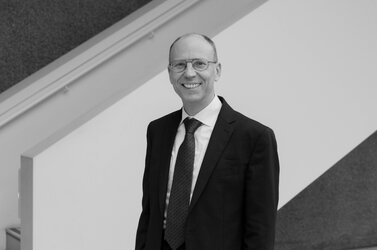
Deggendorf Institute of Technology mourns the loss of Prof. Dr Cezar Ionescu, who passed away on 7 October 2024 after a short, serious illness. In Prof Ionescu, DIT has lost a highly esteemed and respected colleague from its university family. The university will remember him with great esteem and deep respect.
In 2019, Prof Ionescu took up his professorship at DIT as an internationally renowned scientist in the field of artificial intelligence. With his profound expertise, he made a significant contribution to the establishment of the newly founded Faculty of Applied Computer Science and the successful introduction of the Artificial Intelligence degree programme. In his role as student advisor, he was always highly committed to the interests of the students.
Prof Ionescu was an outstanding personality who enriched the lives of many through his optimism, collegiality, helpfulness and warmth. The news of his death fills the entire university with deep sadness. Our condolences go to his family and all those who worked closely with him.
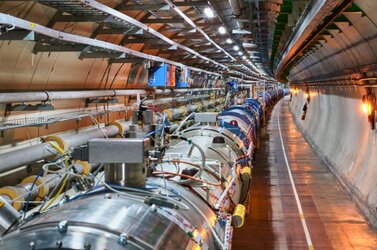
The European Organisation for Nuclear Research (CERN) is a major research facility of international standing located near Geneva. Every year, the organisation hosts a series of computer science lectures, the CERN Spring Campus, in one of its 23 member states. In March 2024, this event will take place at Deggendorf Institute of Technology (DIT).
“CERN Spring Campus was first held in 2014 and brings CERN’s high-tech knowledge to the Member States. Over the course of four days, experts from CERN will give lectures on computer science and share their knowledge,” says Prof. Dr. Patrick Glauner, AI professor at DIT. Other key elements of the event include a hackathon and cultural exchanges.
Next year’s CERN Spring Campus will take place at DIT from 11 to 14 March. Lectures will cover topics, such as artificial intelligence, IT security, usability, distributed systems and soft skills. The target group mainly consists of bachelor’s and master’s students of computer science or related degree programmes. A limited number of places are also available for university graduates.
CERN first became aware of DIT as a possible event location through Professor Glauner. The former CERN employee is delighted to continue the collaboration: “So far, I have been able to arrange internships at CERN for several of my students. Now, we are taking a further step with the CERN Spring Campus, bringing CERN’s high-tech knowledge to Lower Bavaria.” Participants will also have the opportunity to receive a certificate worth 2 ECTS credits after successfully passing an examination.
More information about the CERN Spring Campus is available at www.cern.ch/springcampus. Applications are now open. If you have any questions, please contact Prof. Glauner directly at patrick.glauner@th-deg.de or +49 991/3615-453.
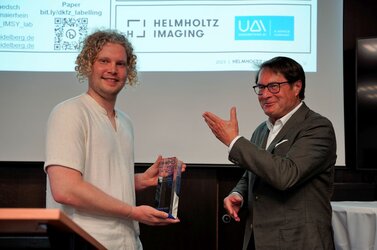
The "Anton Fink Science Prize for Artificial Intelligence (AI)", which has been awarded by the Deggendorf Institute of Technology (DIT), will enter its third round in 2024. Individuals, start-ups, universities, research institutes, foundations or companies can win. The prerequisites are ground-breaking achievements in the research, development or practical applications of artificial intelligence. 10,000 euros will be awarded as the main prize, as well as the young talent award for final theses with 1,000 euros.
"Competitive mechanical engineering, modern services and innovative medical technology are at the core of our prosperity," says pharmacist Anton Fink, explaining his personal motivation to offer this prize again. In addition, the topic of human-machine interaction is particularly close to his heart. "That is why the current call for entries also includes AI applications in the field of human-machine interaction," as Fink mentions. The prize is intended to honour and promote corresponding digital innovations that are concretely used in companies and are methodologically sound.
Applications with projects or research results are accepted from all over Europe. The deadline for applications is 31st January 2024. Applications must include information on the projects or research results, a sketch of the innovation created by them and a curriculum vitae of the applicant.
Individuals aged 18 and older who are resident in Europe are eligible to apply. But also groups or companies that have their headquarters there. However, these must designate a natural person to make the application and take responsibility for it. Submissions are accepted in both German and English.
Prof. Dr. Patrick Glauner, who is primarily responsible for supervising the science prize on the DIT side, is pleased with the latest award-winning AI innovation: "Tim Rädsch from the German Cancer Research Institute and the Karlsruhe Institute of Technology (KIT) convinced us with his world-wide first systematic study on annotation instructions in biomedical imaging." A resulting scientific publication on this topic has also recently been published in an internationally renowned journal.
The award ceremony is scheduled for 14 May 2024 in Deggendorf. The jury includes the former Bavarian Minister of Science Bernd Sibler and the founder, pharmacist Anton Fink himself.
Details on the call for entries are available at www.th-deg.de/ai-prize.
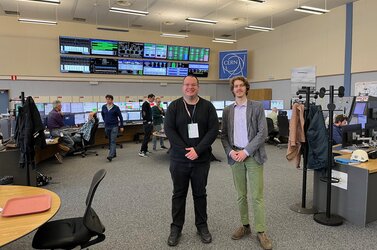
Maximilian von Hohenbühel has been studying Artificial Intelligence at the Deggendorf Institute of Technology (DIT) since 2020. For his practical semester, he was looking for a very special place. Now the student from Deggendorf is working for a year at CERN, an internationally renowned large-scale research facility near Geneva.
Since September 2022, von Hohenbühel has been completing his practical semester at the European Organisation for Nuclear Research, or CERN for short. This is located partly in France and partly in Switzerland. Basic research in physics is carried out there. In particular, the structure of matter is researched with the help of large particle accelerators. The most important one at present is the Large Hadron Collider (LHC), which went into operation in 2008. Von Hohenbühel works there on the development of software for the CERN Control Centre, from which the particle accelerators are monitored and controlled. "The size of CERN," says the 21-year-old, "is impressive. I can actively contribute here and the software I developed is used directly here." Since the previous internship went very well, he was able to extend it. He is now writing his Bachelor's thesis on an AI topic in this environment at CERN.
Von Hohenbühel became aware of the possibility of an internship at CERN through DIT Professor Dr. Patrick Glauner. The former CERN employee sums up his experience there positively: "For me, my three years at CERN were very enriching from a professional and personal perspective." In addition, he says, the time there was a real career accelerator. After taking up his professorship three years ago, Glauner therefore set himself the goal of "establishing a cooperation between the Deggendorf Institute of Technology and CERN". The AI scientist is pleased that these efforts are now bearing real fruit thanks to what is now the second intern. Further cooperation for the next twelve months has only recently been agreed, according to Prof. Glauner.
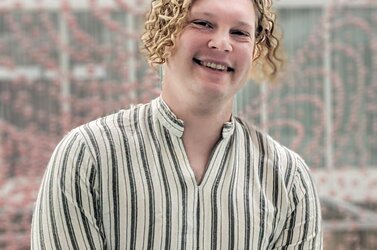
At the end of 2022, the Deggendorf Institute of Technology (DIT) announced the "Anton Fink Science Prize for Artificial Intelligence (AI)" for the second time. Now the prize winner has been announced. It is Tim Rädsch from the Department of Intelligent Medical Systems (IMSY) at the German Cancer Research Center (DKFZ) who convinced the jury the most. He now receives the prize money of €10,000 for his research.
18 AI research teams from Germany and Austria had applied for the Fink AI Prize and did not make it easy for the jury around DIT professors Dr Patrick Glauner and Dr Heribert Popp. In the end, doctoral student Tim Rädsch from the DKFZ in Heidelberg won the race. "Mr Rädsch's thesis was written during his Master's degree at the Karlsruhe Institute of Technology (KIT) in cooperation with the DKFZ. It was particularly convincing and we therefore decided to award him the main prize," reports Glauner. In his submission, Rädsch presented the first systematic study on annotation instructions in biomedical imaging. He was able to show that the quality of the guidance is crucial for the quality of data sets, which form the foundation for AI algorithms. "A resulting scientific paper on this topic was also recently published in the internationally renowned journal Nature Machine Intelligence" Glauner underlines the high quality of the work.
The jury was completed by the former Bavarian Minister of Science Bernd Sibler, DIT President Prof. Dr. Peter Sperber, Prof. Dr. Markus Mayer, FH Professor DI Dr. Stefan Huber from Austria, Assoc. Prof. Ivo Bukovsky, Ph.D. from the Czech Republic and the founder Anton Fink. It also decided to award a young talent prize of €1,000 for the best thesis submitted. Here, the submission of Tri-Thien Nguyen, MD, prevailed. He works as an assistant physician at the Institute of Radiology and Neuroradiology at Klinikum Fürth and at the same time completed a Master's degree in medical technology at Friedrich Alexander University Erlangen-Nuremberg. In his master's thesis, he had implemented an innovative AI-based approach for the detection of an arterial occlusion of the thigh by magnetic resonance angiography.
The donor of the prize, Anton Fink, a pharmacist from Deggendorf, has been associated with the DIT for many years. "With the AI Prize, I would like to make a contribution to strengthening teaching, research and development," says Fink. The award ceremony will take place at DIT on the morning of 11 May 2023, together with several AI expert lectures.
More information on the DIT's AI Prize can be found at www.th-deg.de/ai-prize. If you have any questions, please contact Prof. Glauner directly at patrick.glauner@th-deg.de or +49 991 3615 453.
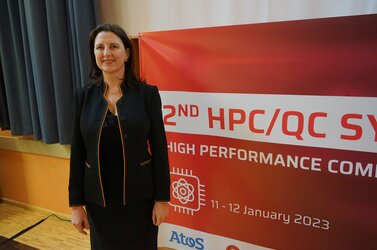
The Deggendorf Institute of Technology (DIT) started the year with a two-day international conference. Three renowned speakers and nine expert companies from industry accepted the invitation from Dr. Helena Liebelt, Professor at the Faculty of Applied Computer Science, on 11 and 12 January. They shared their experiences with around 70 participants on the future topic of "High Performance Computing (HPC) and Quantum Computing". The highlight of this conference was that the companies had worked on their presentations together with students from the university during the winter semester.
Quantum technology in connection with high-performance computing, as it is called in technical jargon, is a trend-setting innovation driver in industry. Especially in mechanical engineering as well as in the chemical and health industries, these are playing an increasingly important role. The contents of the HPC symposium, which took place in the Deggendorf Stadthotel in presence and parallel online, were wide-ranging. They included the presentation of innovative data centres, CPU technologies, requirements for artificial intelligence in healthcare or complex customer problems, calculating precise weather forecasts or the architecture of a cooling system for data centres.
"All the students," explains Liebelt, "worked closely with the renowned HPC/QC experts and used the direct exchange as an opportunity to network. Not only on a content level, but of course also on a professional level." The latter was a valuable side effect that the young people very much welcomed, as the DIT professor reported.
The crowning glory of the conference was the live feed from Prof. Dr. Anne Matsuura in the United States to announce the two winners of the world's first Intel Quantum Computing Challenge.
The Deggendorf HPC Symposium took place for the second time this year. Since quantum technology is a very broad field and many new developments and innovations can be expected for the participants and students in the future, the series is to be continued. All participants also agreed that this symposium is a successful platform for motivating students, bringing them closer to practice and acquiring them as future employees.
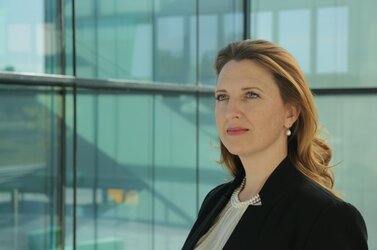
The UNICUM Foundation has announced this year's winners of the "Professor of the Year" competition. The Deggendorf Institute of Technology (DIT) is proud to announce that Prof. Dr. Helena Liebelt has won second place in the category "Engineering/Computer Science". Prof. Dr. Liebelt is head of the IT Centre and responsible for the HPC & Quantum Computing and Data Center Management degree programmes. First place went to Prof. Dr.-Ing. Dirk Sauer from Osnabrück University of Applied Sciences and third place to Prof. Dr. Jens Liebehenschel, Frankfurt University of Applied Sciences.
"Professor of the Year" honours professors who support their students in a special way in preparing them for their careers and who act as career pathfinders throughout Germany, it is not the lectures but the overall commitment of the candidate(s) that is honoured. The corona-induced closure of universities has created major barriers between teachers and studients, employers and career entrants. Consultation hours, internships, job fairs, exchange of experiences - all this could only take place virtually at best.
Liebelt has understood how to take on this pandemic as a special challenge and remain accessible to her students. Sven Kufner, 2nd executive of the Student Convention at the DIT, comments as follows: "Professor Liebelt supports us students in every way. In addition to practical presentations on current topics such as High Performance Computing, she regularly enlists personalities from business and research to introduce us to topics related to computer science from a wide variety of perspectives." The IT professor is also committed to the professional development of her students. For example, she arranges interesting internships with companies, provides support in choosing topics for Bachelor's theses and also goes above and beyond the call of duty to find employment after graduation.
"To belong to this circle is a really great honour for me," Liebelt explains enthusiastically. But this is also a distinction for the entire DIT, she adds. "At the university, no stone was left unturned in finding digital solutions for teaching during the crisis," the IT professor continues. The design framework was large, and the expertise and creativity of the professors had free rein. Now it is a matter of further combining, expanding and optimising the best of both worlds, analogue and digital.
Master's student Yaknan Gambo also appreciates his professor: "I have rarely met a teacher or manager who supports others professionally with so much fun and passion". In his view, Liebelt possesses the rare gift of bringing out the best in students and carrying them to success.
The award winners were chosen by an independent jury chaired by the former rector of the University of Duisburg-Essen, Prof. Dr. Ulrich Radtke.
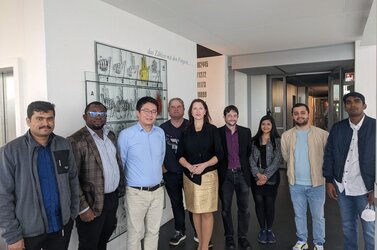
Quantum computing has only been part of the teaching portfolio of the Deggendorf Institute of Technology (DIT) since 2021. Nevertheless, in this short time, DIT has managed to bring its research onto the global stage. The current edition of the "Bavarian Quantum Computing eXchange" (BQCX) on 9 November was completely dedicated to innovative research at DIT.
"We are on a par with global players in the field of quantum computing," finds Prof. Dr. Helena Liebelt, the professor responsible for quantum computing at the university. The BQCX is a format of the Leibniz Computing Centre from the heart of Munich Quantum Valley. Once a month, there is an exchange between research and industry on progress in quantum computer sciences. This time, DIT professors Dr. Rui Li, Dr. Peter Faber and Dr. Helena Liebelt shared the stage with a number of young scientists from Deggendorf to talk about current results in Quantum AI, simulations and Quantum Fluid Dynamic. Those interested can find out more here: https://www.quantum.lrz.de/bqcx.
DIT was also represented with its results on the European stage at the end of October. Namely, at the international conference ACAT (Advanced Computing and Analysis Techniques in Physics Research) of the renowned CERN. In her keynote speech, Liebelt gave an overview of the path quantum technology has taken so far and where it stands today. In her presentation, she paid special attention to the development of young talent. "Training talent is exactly what we do at DIT," the Deggendorf IT expert explained enthusiastically. "Around half of the people currently still studying the Master's in High Performance Computing in Deggendorf have already been taken, and that's already a strong signal." DIT delegation's presentations have in turn led to new contacts and requests for further keynotes, also at international level.
Further international presentations by Professor Liebelt are planned for mid-November at the world's largest conference for high-performance computing, networking, storage and analysis, SC22 in Dallas (USA). All this shows "that research from the Bavarian Forest is taking a leading role, and that the Deggendorf programme for High Performance and Quantum Computing (HP/CP) is also attracting international attention," says Liebelt.

The campus of the Deggendorf Institute of Technology (DIT) was buzzing with people: On Thuesday, 4 October, around 2,200 students began their studies in Deggendorf and at the campuses in Cham and Pfarrkirchen. Officials of the university, the city and the student institutions warmly welcomed the newcomers.
Deggendorf’s Mayor Dr. Christian Moser started the Freshers’ day. He warmly welcomed all students to the city of Deggendorf and focused on anticipation: The Christmas market in Deggendorf will take place this year. The prospect of mulled wine and biscuits made those present very happy in view of the initially chilly temperatures. Prof. Waldemar Berg, Vice President of DIT, encouraged the prospective students to take their studies seriously and to take advantage of the opportunities and potential at DIT. At the same time, he said, studying is a formative time in personal and social terms. Leisure time and friends are just as important a part of this period of life as learning. In Deggendorf, a city with a distinctive nightlife and an extremely attractive surrounding area, the best conditions exist for all of this. Afterwards, representatives of the various higher education institutions, the student union and the university’s church congregations welcomed the newcomers to Deggendorf in both German and English. This has long been a common and necessary procedure at the Deggendorf Institute of Technology, as DIT’s strategy continues to bear fruit. With 41 percent international students from 123 countries, the Deggendorf Institute of Technology is one of the most international universities in Bavaria. The university is still growing. Around 2,200 students will begin their degrees at DIT in the winter semester. According to Dr. Jörg Kunz, the numers will still increase, as there are still a number of open enrolments that will be counted once complete. A total of 8,500 students are currently studying at the campus in Deggendorf and at the teaching locations in Pfarrkirchen and Cham.
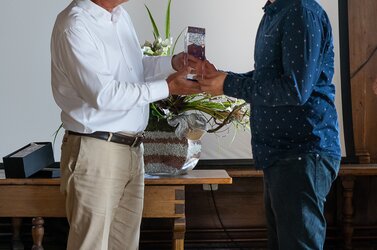
The "Anton Fink Science Prize for Artificial Intelligence (AI)", which was awarded for the first time this year by the Deggendorf Institute of Technology (DIT), will go into the second round in 2023. Individuals, start-ups, universities, research institutes, foundations or even companies can win. The prerequisites are ground-breaking achievements in the research, development or practical applications of artificial intelligence. 10,000 euros will be awarded as the main prize, as well as the young talent award for final theses with 1,000 euros.
"Competitive mechanical engineering and modern services are at the core of our prosperity," says pharmacist Anton Fink, explaining his personal motivation to offer this prize again. In addition, the topic of medicine is particularly close to his heart. "That is why the current call for entries also includes AI applications in the field of medicine," as Fink explains. The prize is intended to honour and promote corresponding digital innovations.
Applications with projects, research results or teaching offers are accepted from Germany, Austria and the Czech Republic. The deadline for applications is 31 January 2023. Applications must include information on the projects, research results or teaching offers, a sketch of the innovation created by them and a curriculum vitae of the applicant.
Individuals aged 18 and older who are resident in the countries mentioned are eligible to apply. But also groups or companies that have their headquarters there. However, these must designate a natural person to make the application and take responsibility for it. Submissions are accepted in both German and English.
Prof. Dr. Patrick Glauner, who is mainly responsible for supervising the science award on the DIT side, is pleased with the AI innovations that won prizes this year: "Prof. Dr. Jan Schmitt from the University of Applied Sciences Würzburg-Schweinfurt had convinced us with his many years of work on the production-related use of flexible and precise robots". In addition, the young talent award went to Sarah Riedmann and Jonas Harb from the Salzburg University of Applied Sciences. In their double master's thesis, both had implemented an innovative guidance control system for production systems with the help of "Deep Reinforcement Learning".
The award ceremony is scheduled for 11 May 2023 in Deggendorf. The jury includes the former Bavarian Minister of Science Bernd Sibler and the founder, pharmacist Anton Fink himself.
Details on the call for entries are available at www.th-deg.de/ai-prize.
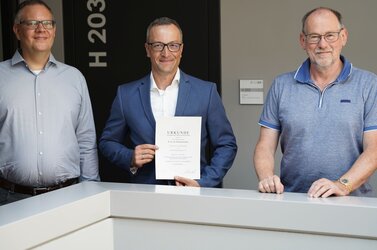
On 1 September, another professorship was successfully filled in the Faculty of Applied Computer Science at the Deggendorf Institute of Technology (DIT). Prof. Dr. Thomas Buchmann, an expert in software engineering and model-driven software development, joins the growing faculty at DIT with immediate effect.
The IT specialist looks back on a successful academic career at the University of Bayreuth. His diploma in mathematics in 2002 was later followed by a doctorate (2010) and habilitation (2017), both in computer science. "After that, I taught and researched for five years as an academic councillor at Bayreuth University," Buchmann reports. But the 45-year-old native of the Upper Palatinate also brings practical business experience with him to Deggendorf. Between his studies and his doctorate, Buchmann worked for Desko GmbH, a developer of hardware for reading documents such as ID cards, barcodes, magnetic strips and chip cards. There he headed the software development department for three years. Prof. Buchmann, who describes himself as "calm, level-headed, but also determined", finds the development dynamics at DIT particularly interesting. "The growth that the Deggendorf Institute of Technology has to show," says the software expert, "is quite impressive." This has excited him and he would like to be on board in order for him to bring his own extensive experience to research and contribute to teaching.
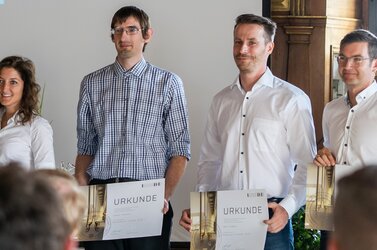
They are not only the first in Deggendorf, but in all of Germany: In a ceremony in the city’s Old Town Hall, the Deggendorf Institute of Technology (DIT) said goodbye to the graduates of the Bachelor’s programme in Artificial Intelligence at the end of June. Seven former students were delighted to receive their certificates from the hands of programme coordinator Prof. Dr. Heribert Popp and AI professor Dr. Patrick Glauner.
A special video message came from Germany’s largest institute for artificial intelligence (DFKI). Managing Director Prof. Dr. Antonio Krüger did not miss the opportunity to send special greetings to Deggendorf on the occasion of the first Bachelor AI graduates in Germany. He appealed: Be aware of your ethical responsibility and put people at the centre of your AI projects. Krüger emphasised the key role of artificial intelligence for the future and praised the Deggendorf Institute of Technology for recognising this faster than other universities and consequently being able to say goodbye to the first graduates. The initiator and coordinator of the programme, Prof. Dr. Dr. Heribert Popp, congratulated his former students. He pointed out that with this certificate they had bright prospects not only in Germany and Europe. With a degree from DIT, one of the most successful university start-ups in Bavaria with enormous growth, an above-average international share and internationally successful rankings, they would not have to hide in the USA either, said Popp.
Artificial Intelligence has been booming for several years, skilled workers are in short supply, and the federal and state governments are trying to promote the topic with considerable funds. The Deggendorf Institute of Technology reacted quickly and has been offering the Bachelor’s programme in Artificial Intelligence since 2019. At the start of the new degree programme, already trained computer scientists from the various disciplines were also admitted. They were able to have the common modules from their computer science studies credited to them. In addition, all students were already working in IT professions, and the necessary practical semester was also omitted. Thus, in October 2021, the first students were able to successfully complete their Bachelor’s degree in Artificial Intelligence at DIT after only two years of study and while working.
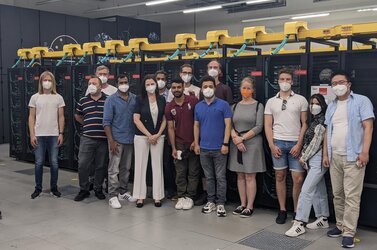
Two of the currently fastest supercomputers in Germany are located in computing centres near Munich. The Leibniz Supercomputing Centre (LRZ) and the Max Planck Society are responsible for the high-performance computers. They have now given students from the Deggendorf Institute of Technology (DIT) a rare look behind the scenes.
During the excursion to Garching, the students of the Master's degree programme High-Performance Computing/Quantum Computing were able to take a close look at the supercomputers of both computing centres. "SuperMuc-NG" and "Raven&Raven" are ranked 2nd and 5th respectively among the fastest supercomputers in Germany. "SuperMuc-NG" of the Leibniz Supercomputing Centre is even listed as the 26th fastest computer worldwide.
From the scientists of the Leibniz Supercomputing Centre and the Max Planck Society, the students learned more about the infrastructure and operation of these high-performance computing centres - from hardware to software to security measures to research and services performed. According to Prof. Dr. Rui Li and Prof. Dr. Peter Faber, the first look inside the supercomputer "SuperMuc-NG" was impressive. The group was also particularly interested in the energy and cooling system. Especially with regard to the topic of sustainability. The hosts answered questions in detail. The group of visitors was surprised that even groundwater from the Isar wetlands is used to cool the computer centres.
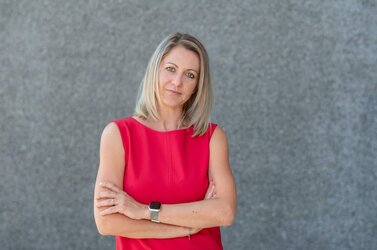
The Deggendorf Institute of Technology (DIT) has succeeded in acquiring funding from the German Research Foundation (DFG) for basic research in black skin cancer. Prof Dr Melanie Kappelmann-Fenzl is researching the molecular basis of black skin cancer. She is particularly interested in deciphering the misdirected activation in tumours, i.e. why a birthmark changes pathologically. In the future, individualised diagnostics and therapy for those affected could be derived from this.
Personalised medicine and highly innovative therapy approaches have been finding their way into the treatment of cancer for years. Intensive, interdisciplinary basic research is necessary for this. It should uncover what happens in the tumor cells and reveal the complex interrelationships in ever greater detail. That is what Melanie Kappelmann-Fenzl is doing with the help of bioinformatic data. Thanks to the German Research Foundation, she will be able to strengthen her team over the next three years and has found a cooperation in the Friedrich-Alexander University of Erlangen-Nuremberg. Kappelmann-Fenzl’s vision is clear: “This basic research, which is now also being funded in Deggendorf, will hopefully create a better understanding and perhaps reveal approaches for individualised diagnostics and therapy, which, among other things, can have a corresponding effect on healthcare in the region as part of the Medical Campus in Lower Bavaria.” With the help of the funding provided by the DFG, academic training at DIT can also be deepened in this direction. A doctoral position in bioinformatics is expected to be available for this purpose at the end of 2022. Melanie Kappelmann-Fenzl has already been working on the training of data analysts as part of the Master’s programme in Life Science Informatics since 2019.
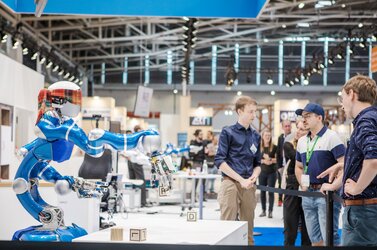
At the end of June, the joint research team of the Deggendorf Institute of Technology (DIT) and the German Aerospace Center (DLR) presented itself at the "Automatica". Under the direction of Prof. Dr.-Ing. Berthold Bäuml, the latest research results in the field of "Intelligent Robotics", or more precisely, on skilled, robotic manipulation, were shown. And they amazed not only the scientific community.
Automatica is the leading global trade fair in the field of automation and robotics. Every two years, around 30,000 visitors come to Munich, with a high proportion of trade visitors. "We were able to show a wide audience our work on learning skilled in-hand manipulation, which is unique in the world so far," reports Prof. Bäuml enthusiastically. The idea behind this is that a robot in a multi-fingered hand moves an object without dropping it. And it does so upside down and without looking - in other words, only with the help of the sense of touch. "This complex exercise," explains Bäuml, "was learned completely independently in a simulation in just 36 hours using so-called "reinforcement learning" and then executed with the real hand of the DLR humanoid "Agile Justin"." What may sound simple to people who are not familiar with this topics is in fact not. The work of the DIT-DLR laboratory "Autonomous Learning Robots" attracted great interest and recognition at the fair. And not only with the Minister of Science, Dr. Markus Blume, but also with the numerous, internationally highly renowned scientists represented as well as with some important CEOs of the robotics industry. Bäuml reports that his team succeeded in surpassing the results originally shown by the company OpenAI for learning robotic in-hand manipulation. And OpenAI is not just anyone. After all, the US company is funded by Elon Musk, among others. OpenAI had recently abandoned the topic because of too many problems. "To have successfully stayed with it," says the DIT professor, "makes us a little proud."
The DIT-DLR Joint Research Lab is a joint research group of the Deggendorf Institute of Technology and the Institute of Robotics and Mechatronics of the German Aerospace Center with laboratories at the BITZ in Oberschneiding and the DLR site in Oberpfaffenhofen. Since the beginning of 2022, work has already been underway on the commercialisation of the robotic hand as well as the intelligent learning processes for applications in industrial production as part of the "SmartHand" research project funded by the Bavarian Ministry of Economic Affairs together with a company from the Deggendorf region. This is seen as a key technology, as only through a massive expansion of automation will production in Germany still be possible at all in the future. Especially because of the shortage of labour.
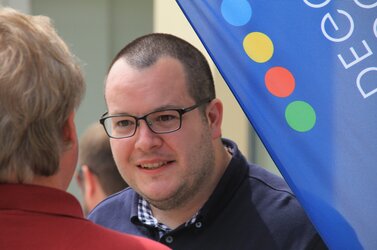
Artificial intelligence - how deep is it already in our lives? Professor Dr. Patrick Glauner will explore this question in the first "Science Hour" at the Deggendorf Institute of Technology (DIT). The Science Hour is a new offer at DIT. All interested listeners are invited to come to the university, listen and discuss. The first edition will take place on Wednesday, 18 May at 6 pm at the campus in Deggendorf and simultaneously online.
For the premiere, Prof. Glauner will be answering questions on the topic of artificial intelligence. The AI specialist is known in his field far beyond Lower Bavaria. He has advised the German Bundestag, the French National Assembly and the Luxembourg Chamber of Deputies as an expert on political issues relating to AI. The renowned Chief Data Officer Magazine lists Glauner as one of only three Germans on its internationally recognised list of experts in data science. In his lecture at the Science Hour, he will show what AI actually is and where it already has an impact on all of our lives. The various research approaches at DIT will be discussed, as well as the countless career prospects offered by this field. A special treat for the first Science Hour: After the lecture, anyone who wants to can visit the DIT's Deep Learning Lab in Degg's.
"With the Science Hour we are addressing all citizens in and around Deggendorf. We welcome them to the university and create the unique opportunity to experience DIT up close. This way, anyone interested can get an insight into what it's like at the university and what topics our professors deal with," Angelika Hable from DIT's MINT team advertises the new offer. She is particularly looking forward to the lively discussions that arise when people of all ages question a topic.
The Science Hour is organised by the MINT Team of the Deggendorf Institute of Technology. The event is free of charge, registration is not required. The Science Hour will take place in lecture hall B.004 at the DIT. If you would like to join online, you can find the link at www.th-deg.de/sciencehour.

In order to promote their common interests in teaching, research and transfer and the desire to strengthen mutual contacts, the Deggendorf Institute of Technology (DIT) and the KI Bundesverband have signed a declaration of joint cooperation. Within this cooperation, the KI Bundesverband is represented by the Academy for Artificial Intelligence (AKI).
Artificial intelligence is a key technology of the future, which is why DIT and AKI are committed to ensuring that it is applied in the spirit of European and democratic values and that Europe achieves digital sovereignty. However, this means that both Germany and the European Union must be an attractive AI location for research and business.
In order to come closer to this goal, DIT and AKI will cooperate in various areas. For example, joint research activities are planned, but also the development of joint programmes for SMEs and other social groups to strengthen the handling and acceptance of AI. In addition, DIT will be represented by Prof. Dr. Patrick Glauner on the AKI's scientific advisory board to accompany and support its offerings.
DIT President Prof. Dr. Peter Sperber is pleased about the cooperation: "The fact that the KI Bundesverband has decided to cooperate with DIT impressively proves that we are leaders in the field of teaching, research and transfer to AI." The new collaboration will also allow DIT to work more closely with the AI scene in and around the federal capital, he added.
Daniel Abbou, Managing Director of the AI Bundesverband, adds: "We are also very excited about the collaboration with the Deggendorf Institute of Technology. DIT knows about the relevance of artificial intelligence in research and application. We are convinced that our cooperation will strengthen the German AI ecosystem in research and business."
More information on DIT's AI offers can be found at www.th-deg.de/en. If you have any questions, Prof. Glauner is also available as a direct contact at patrick.glauner@th-deg.de or 0991/3615-453.
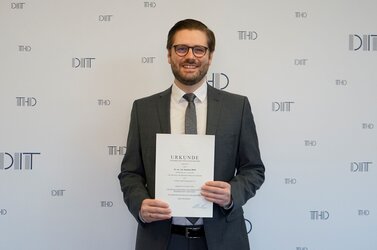
Dr Andreas Wölfl was appointed professor at the Faculty of Applied Computer Science at the Deggendorf Institute of Technology (DIT) on 1 April. The 37-year-old computer scientist, who comes from Bodenmais in the Bavarian Forest specialises in digital networks and operating systems.
The fact that DIT offers perfect conditions “for conducting industry-oriented research, actively involving students in the research process and feeding the results back into teaching” was one of the main criteria for Wölfl to take the next step in his career at the Deggendorf Institute of Technology. Thematically, the computer scientist’s interests lie in cloud computing. Wölfl is particularly concerned with the question of how complex software systems must be designed in order to be able to use the cloud infrastructure as efficiently and economically rewarding as possible.
The newly appointed professor studied computer science at the University of Passau. AS a research assistant, he also completed his doctorate there as part of a cooperation with Airbus Helicopters. Afterwards, Dr Wölfl worked for ONE LOGIC GmbH as Head of Development/ Operations. The medium-sized company in Passau operated in the field of data science and artificial intelligence. In his role, Wölfö was the interface between the internal development department and the customer’s IT operations. His core activity was also creating the concept of AI system architectures for start-ups, medium-sized companies and DAX corporations.
Wölfl is very much looking forward to his new tasks at DIT: "I am fascinated by the balancing act between practical research and modern teaching." For example, Wölfl wants to establish container-based virtualisation, serverless architectures, hybrid connectivity and other disciplines of cloud computing in research and teaching at DIT. "These," says the computer science professor, "are new, innovative contents for a successful as well as future- and market-oriented education of our students." Basically, competence orientation is very important to him in teaching. In other words, the ability to confidently apply learned knowledge and transfer it to complex situations. But Wölfl is also looking forward to all the upcoming research projects with great excitement. "Together with our colleagues at DIT and the renowned external industrial partners, we can and will certainly make a difference," Wölfl is certain.
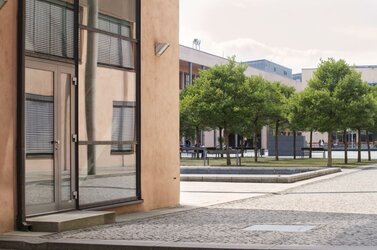
Do some networking and gain more knowledge in the field of artificial intelligence - this is what the first international Summer School at the Deggendorf Institute of Technology (DIT) offers from 26 July to 3 August. Doctoral and Master's students from all universities can apply for the nine-day intensive programme. DIT’s International Office is now calling for applications.
The Summer School "AI for Industry" deals with the question of how to bring artificial intelligence into industrial applications. Participants will hear lectures, expand their knowledge of the Python programming language and take part in a hackathon - all in English. More information and the detailed programme are available on the university's website: www.th-deg.de/ai-for-industry. Applications are accepted from 1 March to 1 May 2022. If you have any questions, the International Office team can be contacted via e-mail at summer-school@th-deg.de.
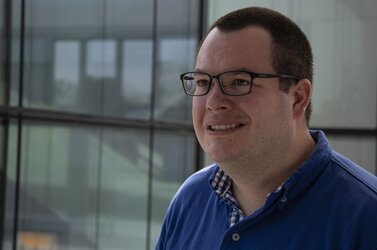
One of the world's leading data scientists teaches at the Deggendorf Institute of Technology (DIT). Every year, the renowned Chief Data Officer Magazine publishes an internationally recognised list of experts in data science. Listed on it are outstanding experts and now also Prof. Dr. Patrick Glauner from DIT. Along with two professors from TU Munich, Patrick Glauner is one of the only German representatives to make it onto the CDO Magazine list. All three stood out for their intensive commitment in 2021.
Science Minister Bernd Sibler offered his congratulations and emphasised: "In a digitalised world, precise, fast and reliable processing and evaluation of data and information are essential. With your work, you are making a central contribution to shaping our future. With our innovation offensive Hightech Agenda, we have laid the foundation for Bavaria as a science location to further expand its visibility and competitive position in this coveted market."
Patrick Glauner has been Professor of Artificial Intelligence at the Deggendorf Institute of Technology since 2020. In spring 2021, he advised the German Bundestag and the French National Assembly on AI as an expert witness. He is pleased that he has been able to successfully place his innovations at DIT on a national and international level over the past two years. He has many more ideas for the coming months and years and is looking forward to their outcome. His professional focus is on machine learning, quantum computing, AI applications in mechanical engineering and innovation management.

In October 2021, the new interdisciplinary lecture on quantum computing started at the Deggendorf Institute of Technology (DIT). With this, the university is further expanding its innovative range of courses. Students from over 20 degree programmes are introduced to and trained in this key technology in a practical way.
In recent years, the topic of “Quantum Computing” has gained momentum in research and industry. “Unlike classical computers, a quantum computer does not work on the basis of binary, but quantum mechanical states,” reports Dr Patrick Glauner, Professor of Artificial Intelligence at DIT. Prof. Dr. Horst Kunhardt, Vice President Health Sciences and Campus Director of the European Campus Rottal-Inn adds: “By exploiting quantum effects, countless calculations can be solved simultaneously and thus much faster.” Classical computers, Kunhardt says, can only perform a few computations at a time. With quantum computing, however, it will be possible in the future to analyse huge amounts of data in a very short time. For climate models, for example.
Kunhardt and Glauner had already incorporated references to quantum computing into their computer science lectures in previous years. The students’ high interest in it inspired them to offer a joint specialisation lecture on quantum computing. “Quantum computing offers a multitude of possible applications in almost every industry, even explicitly beyond pure computer science,” Prof. Glauner notes and continues: “That’s why we have made the course explicitly interdisciplinary and advertised it university-wide.” As a prerequisite for participation, knowledge of higher mathematics and programming was sufficient.
About 40 students took part in the first run, among them from the degree programmes in computer sciences, business informatics, mechanical engineering, electrical engineering and mechatronics. One of the participants was the Finnish exchange student Teemu Heino. He is convinced by the new course offer: “In my lecture-accompanying seminar presentation, I dealt with the production of quantum computers and was able to apply my knowledge of mechanical engineering.” Rashed Al-Lahaseh, a Master’s student in Computer Science, is also enthusiastic about the new course. He took the course to understand how quantum computers can accelerate the learning process of an artificial intelligence. With the knowledge they gained in the course, they believe they are well prepared for the future. They would like to further deepen their knowledge in this key technology and use it profitably with a future employer.
More information on DIT’s degree programmes can be found at www.th-deg.de/en. If you have any questions about quantum computing, Prof. Glauner will also be happy to answer them directly at patrick.glauner@th-deg.de or +49 991 3615 453.
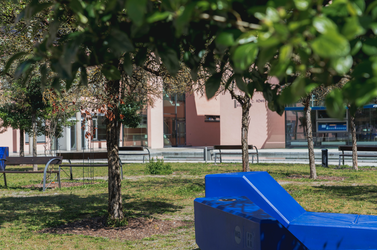
What does the word "truth" actually mean in a time when more and more data and more and more communication channels offer more and more opportunities to somehow convey virtually any opinion as truth? The already traditional "Deggendorf Forum for Digital Data Analysis" (DFDDA) under the direction of Prof. Dr. Georg Herde (Deggendorf Institute of Technology) asked itself this question. At the 16th forum event on Wednesday and Thursday, experts from tax auditing, tax consultancy and finance discussed the possibilities and limits of so-called artificial intelligence (AI). The motto of the event, which was virtual for the third time due to the Corona pandemic, was: "No signal - is the truth disappearing in the flood of data?"
Only recently, the Deggendorf Institute of Technology had dismissed its first graduates specialising in artificial intelligence, the Vice-President of DIT, Prof. Dr. Horst Kunhardt, told the audience in a welcoming speech. And he issued an admonition that all speakers at the conference echoed in one way or another: "We must never disregard the human being." At the end of all AI analyses, the critical mind of the human being is still needed, he said.
The guest speaker at the event, Prof. Dr. Klaus Mainzer, Professor Emeritus of Philosophy and Philosophy of Science at the Technical University of Munich, also spoke of "Responsible Artificial Intelligence". Mainzer has followed the development of AI and the expectations of AI on an international level and described in his lecture the path from the development of expert systems, which were supposed to support the doctor in diagnosis through purely logical reasoning from medical data, to the imitation of human brain functions and the search and detection of patterns in large amounts of data, to today, among other things, self-learning automats in automotive technology and the decoding of protein structures and thus the identification of viruses.
Mainzer took up the criticism that such systems are "black boxes", you can see what they find out, but not how they find it out. The systems are "trained like a dog. But in the end, you can still get bitten." Mainzer: "You need visibility, explainability." That means: an expert - a doctor, a specialist engineer - has to decide with his "domain knowledge" whether, for example, a medical diagnosis found automatically is plausible or not. The more influence technology has on people and their everyday lives, the greater the challenge for the training of people who work with this technology. Technology design is required; legal, social, ecological and economic criteria must be included in this design from the outset. Machine learning is "a huge success today", Mainzer said in the subsequent discussion. "But in the end, it is statistics" - with the uncertainties that come with it.
Using the example of the judiciary, Dr Tanja Ihden, FH Krems, who wrote her doctoral thesis in Bremen on "the relevance of statistical methods in jurisprudence", described successes and problems of argumentation with statistics. She is a member of the research unit "Statistics in Court", which was founded in 2014/15. According to Ihden, the number of court decisions in which statistical terms can be found has increased many times over in the past decades. The impetus for this comes from the judiciary itself, in almost all areas, whether it is the assignment of a DNA sample to a suspect, or reconstructions of an accident through scenarios, or the question of whether a man on whose computer photos from the borderline area of child pornography, which is not yet punishable, are found, is also very likely to possess prohibited photos. Judges are increasingly confronted with terms such as variance or confidence interval, which they must be able to correctly classify in their judgements, says Ihden. Being able to read statistics and evaluate statistical reasoning has become a key qualification for judges, he said.
Tawei (David) Wang, PhD, Associate Professor and Driehaus Fellow, Driehaus College of Business, DePaul University, Chicago, USA, demonstrated how risky the use of social media by employees can be for a company. His study shows how social media data can be used to find security weaknesses in companies' computer systems. Wang and colleagues used the LinkedIn network for their research, but consider the result transferable to other networks. They extracted thousands of personal data with information on current and former professional activities, areas of responsibility and locations and formed an exposure index for the company from the results. The result was a positive relationship between this index and the number of data breakdowns in the company's computer network.
The challenges posed by growing computing capacities, new processes and new procedures, such as AI, in companies also place new and expanded demands on auditing. Karsten Thomas, Partner IT-Assurance at BDO AG Wirtschaftsprüfungsgesellschaft, gave examples of where new, constantly developing tools can also help the auditor to improve the efficiency and quality of the audit. He does not see any fundamental competition between the goals of quality and efficiency. A high degree of automation also reduces the susceptibility to errors and can relieve the auditor. It could also make it easier to recognise anomalies. Thomas presented concrete tools from auditor practice. Outliers in analysed data are a particular challenge. The effort to clarify and assess them is high. There is great hope for AI procedures, but Thomas does not yet see their use at this point. One reason he gave was that, depending on the company, not every anomaly has to be an error, and that it is difficult to obtain training data for machine learning in companies with their individual design of data systems and processes.
A special form of mass data analysis for tax purposes was presented by Markus Ettinger, Diplom-Finanzwirt (FH) in the large and group tax audit of Schleswig-Holstein. The Foreign Tax Act stipulates how transfer prices between related parties or companies and their subcontractors are checked for taxation purposes to see whether they correspond to market realities. Transfer prices between comparable, unrelated third parties are used for this purpose. Ettinger described, according to the title of his presentation, "Visualisation and Benchmark Studies in Transfer Pricing". For this, comparable companies and criteria for comparability must first be found. Using example data, Ettinger described how a combination of machine screening, ideally interactive methods of visualisation and critical scrutiny of each individual step can be used to compile a comparison set on which the tax classification can be based, as long as the boundary conditions remain unchanged.
At the end of the conference, DFDDA Chairman Prof. Dr. Georg Herde posed the question in his own contribution that bridged the various topics of the conference: "Artificial Intelligence - A Solution for Auditing?" He started from the statement: "New techniques are giving AI a strong impetus." But what does AI "understand" about company data as it is available to the auditor? What correlations does it recognise on its own? From structured company data, the auditor extracts a multitude of tables - which, however, interact in a defined way, which is not automatically recognisable in the tables. And even in a flat table, only a human can recognise the meaning of the entries: Which chart of accounts was used? What kind of date is in the date field? Depending on where a posting record is, it can be wrong or right or even meaningless. From these and other considerations, he derived a perspective for developers: the input fields must be strongly standardised, but already an assignment of the attributes to the data fields cannot be done by an AI, but must be queried anew for each client and executed by hand. "There is no automatic testing of a programme logic," said Herde, referring - mutatis mutandis - to an insight made by the British computer scientist Alan Turing in 1937. In addition, framework conditions such as company structures, prices or laws are constantly changing, so that an AI system would have to be constantly retrained. "These and other problems of AI systems are currently not solvable," Herde noted. Research in this area is therefore important and sensible, he said.
His conclusion: "If an AI system does not say how it arrives at a result, then the examiner can only believe the results. Then he doesn't test."
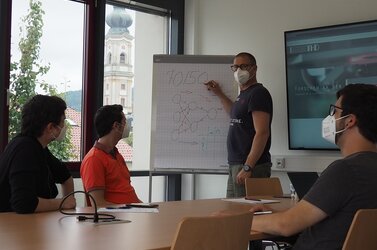
And the DEGGs? It is becoming more and more part of the Deggendorf Institute of Technology (DIT). The AI Centre of the Faculty of Applied Computer Science had already moved in last spring. Now, at the start of the winter semester, up to 120 students can be supervised in presence on around 1,600 square metres of the former medical care centre. In addition, laboratories have been set up for research and work on digital topics. Topics that are also relevant for the further digitalisation of the regional economy.
Prof. Andreas Fischer is the head of the Laboratory for Network Technologies: "Not only classic internet technologies are explored here, but also new types of distributed intelligent applications," explains the DIT scientist. Artificial intelligence algorithms could, for example, help to better plan resources in large-scale data centres, detect anomalies in data traffic or quite practically speed up the forwarding of packets.
Another new addition to the DEGGs is a laboratory for high performance or quantum computing. Prof. Dr. Peter Faber is the boss here. Under his guidance, topics in computer science are served that require extraordinarily high computing power. "Our main focus is on so-called parallel computing" says Faber, meaning that in such cases several variants of a problem are solved simultaneously. For example, an AI can search different areas of a high-resolution image for specific objects at the same time. Parallel processing is also the speciality of quantum computing - the two research fields complement each other perfectly here at DEGGs.
The DeepLearning lab is the realm of Prof. Andreas Berl. Small autonomous vehicles, robotic arms and humanoid robots characterise the first impression. Highly sophisticated AI workstations with access to fast servers in the background allow students to quickly achieve their own successes and thus apply theoretical knowledge directly in practice.
"At the AI Centre, we want to prepare Deggendorf students in the best possible way for the revolutions in the fields of Artificial Intelligence, Industry 4.0, Internet of Things, High Performance Computing and Quantum Computing," confirms Prof. Berl. The three labs offer special practical courses on topics such as network technologies, deep learning and high performance computing or quantum computing. The response has been enormous. Well over 3,000 applicants from all over the world wanted one of the 120 places on the new English-language Bachelor Artificial Intelligence and Master Artificial Intelligence & Data Science programmes. Berl is very pleased about this: "We are proud that the degree programme became known so quickly outside Germany." He also hopes for more applicants from Germany. After all, studying in English boosts career opportunities enormously.
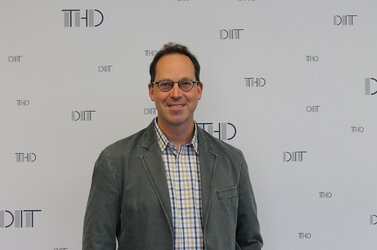
With Prof. Dr. Simon Zabler, the Faculty of Applied Computer Science at the Deggendorf Institute of Technology (DIT) gains an expert in the field of imaging techniques with a focus on computed tomography.
The passionate physicist already dealt with X-ray imaging in his Master's thesis and has not been able to get away from it since. For Zabler, computed tomography is not only an interdisciplinary field that combines computer science, mathematics, physics and mechanical engineering, but it is also constantly reinventing itself. This is precisely the attraction of "digital photography with three-dimensional pixels", as Zabler describes computed tomography. He remained faithful to computed tomography throughout his professional career. Whether during his doctoral thesis at the Hahn-Meitner Institute in Berlin or as a PostDoc at the Max Planck Institute in Potsdam, where he watched cellulose drying in wood. Research and teaching have also accompanied Prof. Zabler for a long time. He already taught materials science at the TU Berlin and then set up a research group for X-ray microscopy and scattering at the University of Würzburg.
One of the reasons Zabler chose the professorship at DIT is that top international researchers have the opportunity here to bring their field of research into teaching. He himself has a German-French double degree in physics and is at home on the international stage of science. Zabler is therefore particularly looking forward to building up a broad network at DIT around computed tomography and machine vision in order to carry out exciting and, above all, international projects. In addition, industry and university work together here in Lower Bavaria in an uncomplicated and results-oriented manner. According to Zabler, it is precisely this networking that offers a great opportunity to direct the focus and knowledge transfer in applied research towards the current requirements of industry.
Zabler also pays special attention to the young talents at DIT and how he can make research fun for them and accompany them on their way. In return, students can expect clear communication, accessibility, fair rules, enthusiasm for the subject matter and readable documents from him. Attendance, critical examination of the material and honest feedback are points that Zabler demands of his students.
Honesty is important to the new DIT professor, who describes himself as compulsively honest. He does not look away when mistakes are made, whether by others or his own, and when injustice occurs. The best prerequisites for changing something. Honest as he is, he also admits that he can only explain things really well when he has understood them himself. Even if he is not always the tidiest and most punctual, he is an unteachable optimist at work. He can also be persuaded to do just about anything with chocolate and / or a good cappuccino. It is therefore not surprising that Zabler not only likes to feast in his free time, but also cooks himself. Preferably in company. He is also interested in history and international politics, but one week a year is devoted entirely to the forest. That's when he is out in the forest with the Bergwaldprojekt e.V. and 25 adults, planting trees and re-wetting bogs.
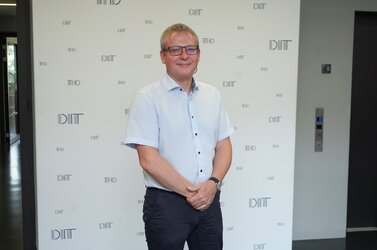
The Deggendorf Institute of Technology (DIT) has increased staff for teaching statistics. Prof. Dr. Stefan Hagl is now working full-time at the university. He is leaving the private sector and wants to concentrate on research in addition to teaching.
Stefan Hagl has been associated with DIT since 2005. First as a lecturer and since March 2012 as a part-time professor. He is pleased that from now on he can strengthen teaching in statistics and data analysis/data science as a full-time professor; both at the Faculty of Applied Economics and now at the Faculty of Applied Computer Science. Students often have a "barrier in their minds" when it comes to mathematical methods and applications. His goal is to make students understand the necessity and the fun of it. Stefan Hagl is sure that his experience as a data analyst at Acxiom Deutschland GmbH will help. Analysing data for customer-oriented marketing is the company's core business and Stefan Hagl's expertise; especially the statistical methods used for this. He worked at Acxiom from 2006 to 2021, most recently in a senior position for the EMEA region, i.e. Europe, Middle East and Africa. His wife and children fully support his decision to become a professor in his home region of Lower Bavaria. He finds compensation in extensive mountain and alpine tours, cycling tours and in the gym.
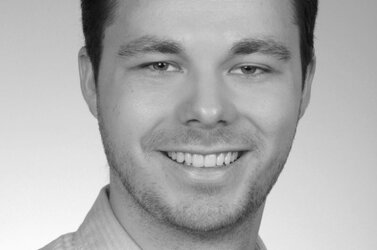
In autumn 2019, the Deggendorf Institute of Technology (DIT) launched Germany's first Bachelor's degree programme in Artificial Intelligence (AI). After just under two years, Lucas Fobian is now Germany's first AI bachelor's graduate.
"AI experts are currently in high demand on the market," reports Prof. Dr. Patrick Glauner. He adds: "However, companies cannot wait three to four years for the first graduates." In addition to the regular start of the new degree programme, DIT therefore offered a one-time programme called "lateral entry". This enabled professionals with a technical degree or those who had changed their field of study to acquire AI skills in just two years. A concept that originated with the then and now retired programme coordinator Prof. Dr. Dr. Heribert Popp.
Lucas Fobian, now the first graduate, was immediately convinced: "During my studies in general computer science, I realised that I was particularly interested in the sub-field of AI. Fortunately, DIT offered lateral entry at exactly this time. This meant that large parts of my basic studies could be credited to me." He carried out his Bachelor's thesis in cooperation with the Bavarian State Criminal Police Office (BLKA). Here he developed an AI from the field of "predictive policing" to forecast residential burglaries. Prof. Glauner supervised this Bachelor's thesis and proudly reports: "The BLKA is very satisfied with the results. It has been confirmed that our AI graduates are excellently qualified for the implementation of AI applications." Currently, almost 15 more "lateral entrants" are working on their Bachelor's theses. They will complete their studies in the coming weeks and will then also be available to the labour market.
More information on the DIT's AI degree programmes can be found at www.th-deg.de/ai-en . If you have any questions about the AI degree programmes, please contact Prof. Glauner directly at patrick.glauner@th-deg.de. Applications for a place on the programme are still possible until 15 August.
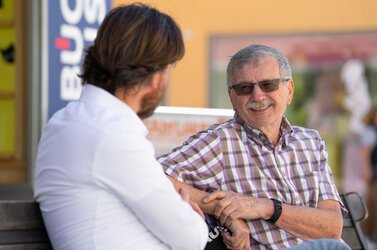
On 29 July, the Deggendorf Institute of Technology (DIT) will once again come to town. On the bench at the Oberer Stadtplatz between the town hall and Pustet this time: the DIT expert for artificial intelligence (AI), Prof Dr Patrick Glauner. From 10.30 am to noon, he would like to talk to citizens about how data and its analysis are already changing our health care and will change it even more in the near future.
The complete mapping of an individual’s genetic make-up is no longer a big deal. You can already get the date for a few hundred euros. In a few years, experts say, they may be as normal as a complete blood count. So the door to individualised medicine is open. “The crucial thing, however, will be how we can use the data, for example from a personal genetic make-up, in an ethically sensible way,” says DIT professor Patrick Glauner. This requires the development of technologies such as artificial intelligence to be able to evaluate and interpret the enormous amounts of data. In addition, blockchain technologies to ensure the necessary data security and quantum computers to realise the necessary computing power. The market for the analysis of genetic data alone is expected to be worth $40 billion by 2030. Accordingly, research and work on this is being carried out at full speed worldwide. The first successes are already emerging in cancer therapy. Not only has the connection between certain genetic constellations and the development of cancer been proven, but also that with individually achieved treatment successes. In radiology and dermatology, AI has long provided valuable diagnostic support thanks to pattern recognition. "The concern that this technology will eventually replace real doctors is unfounded," says Glauner. Rather, the technology is an additional, data-based expertise. The analysis result of an AI, which can incorporate a virtually infinite amount of data into the evaluation, combined with the personal medical experience delivers the best possible treatment suggestion. "But in the end, it is always the human being, the doctor, who decides together with her patient," assures Glauner. Nothing will change in that regard. Of course, the topic of data processing in medicine also has a great ethical dimension. Citizens are welcome to talk to Glauner about this, too. An ethical dimension on two levels, by the way. On the individual level, it must be ensured that everyone can decide for themselves who gets access to personal data. Interesting at this point: In the US, there is already a business model of lending your data to universities or pharmaceutical companies. For a fee, of course. On the societal level, the question arises whether we shouldn't all make our data available to research in anonymised form - or even have to. Because it's clear: only when really large amounts of data, keyword Big Data, come together, does a picture emerge, an interpretation with a high degree of reliability. For the benefit of all those who suffer from incurable diseases today and cannot be cured due to a lack of understanding of these diseases. Many questions, then. Questions that move people. Not only computer scientists and doctors. "Some of them can certainly be answered at the DIT Science Bench," Patrick Glauner is sure.

The details and conditions of participation have now been announced for the previously announce “Anton Fink Science Prize for Artificial Intelligence (AI)”, which will be awarded for the first time by the Deggendorf Institute of Technology (DIT) in 2022. Individuals, start-ups, universities, research institutes, foundations or even companies can win. The prerequisites are ground-breaking achievements in the research, development or practical application of AI. The prize is endowed with €10,000.
“Industrial production and mechanical engineering are at the core of our prosperity,” says entrepreneur Anton Fink, explaining his personal motivation for offering this award. The first focus of the current call for entries is therefore also on AI applications related to Industry 4.0 topics. At the same time, Central Europe is increasingly on its way to becoming a service society. “Therefore, the second thematic focus of the current call is on AI applications in the area of Service 4.0,” says Fink. The award is intended to recognise and promote corresponding digital innovations. Applications with projects, research results or teaching offers are accepted from Germany, Austria and the Czech Republic. The deadline for applications is 31 December 2021. Applications must include information on the projects, research results or teaching offers, a sketch of the innovation created by them and a CV of the applicant. Individuals aged 18 and over who are resident in Germany, Austria or the Czech Republic are eligible to apply. But also, groups or companies that have their headquarters in one of the countries mentioned. These must then appoint a natural person to make the application and take responsibility for it. Submissions are accepted in both German and English. Prof Dr Patrick Glauner, who is primarily responsible for the Science Award on the part of DIT, explains that the jury is commited to treat all information made available to it in the context of the competition as strictly confidential and will use it solely for the purpose of conducting the competition. “However,” Glauner explains, “we recommend that all participants secure any patent applications before publishing them as part of the competition.” This is because the presentation of the ideas or projects could eliminate novelty protection. The award ceremony is planned for Spring 2022. The jury includes Bavarian Science Minister Bernd Sibler and the founder Anton Fink himself.
Details on the call for entries are available at www.th-deg.de/ai-prize
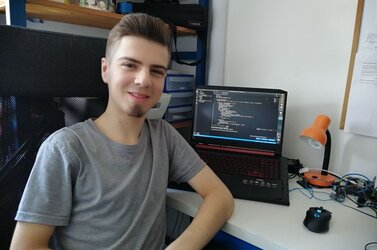
Tamas Nemes attends the grammar school of the Regensburger Domspatzen. The 17-year-old is interested in studying Artificial Intelligence (AI) at the Deggendorf Institute of Technology (DIT). That’s why he is currently taking the course Algorithms and Data structures in the so-called early studies programme there.
“In order to better understand the algorithms underlying AI, I started an early study programme in March,” Nemes reports. The secondary school student benefits from this special offer at DIT for pupils: “The lectures are highly interesting. And working independently on the associated tasks is a lot of fun for me.” Previous knowledge of computer science was not required for participation. The 16-year-old pupil Anna Daiser is also convinced by the early study programme. The early study programmes was introduced for highly talented pupils in high school. While they are studying for their A-levels, they can already participate in University lectures in different study fields. She appreciates that the lectures are well structured and that “the content is conveyed in an understandable way.” Digital teaching has also opened up completely new possibilities for the early study programme, reports lecturer Prof Dr Patrick Glauner: “My course is now taken by interested people from all over Germany. We couldn’t reach them at all before.” Another example is Christian Normann, who did the early study course from his home in Rheinland-Pfalz. He describes his experience as follows: “Last semester I had taken the Computer Vision course. The accompanying robotics project was very educational and I enjoyed it a lot.” Incidentally, the application deadline for the winter semester 2021/2022 at DIT is currently open, until 15 July. From 1 October, prospective students such as Nemes, Daiser or Normann will be able to train as AI experts in seven semesters. For this purpose, DIT offers an AI Bachelor’s programme, optionally in German or English. Participants in the DIT early study programme will then have a good idea of what to expect at the university. Enquiries about early study can be directed to the DIT STEM team at fruehstudium@th-deg.de. More information on the AI degree programmes can be found at www.th-deg.de/en/ai. If you have any questions about the AI degree programmes, Prof Glauner will also be happy to answer them directly at patrick.glauner@th-deg.de or +49 991 3615 453.
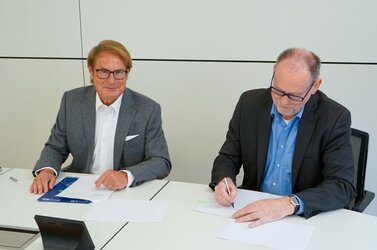
Next year, the Deggendorf Institute of Technology (DIT) will award the “Anton Fink Science Prize for Artificial Intelligence” in the amount of € 10,000 for the first time. This is the highest amount of an award that DIT has presented in the past. As the name suggests, the new “Anton Fink Science Award for Artificial Intelligence” is intended to contribute to strengthening teaching, research and development explicitly in the field of Artificial Intelligence (AI). On 18 May, founder and DIT Honorary Senator Anton Fink made the agreement official with his signature on the cooperation agreement.
As a pioneer in the university landscape when it comes to AI, the DIT can use this award to strengthen, the region in this promising field in parallel to successful initiatives such as the AI Campus Bavaria. Founder Anton Fink has been associated with DIT for many years and would like to see many applications for the science award. The topic of AI fascinates him and he wants to support DIT in a meaningful way. For DIT President Sperber, the advantages are obvious: such a prize will make DIT better known as an institution in the AI scene. In addition, important contacts will be made from which the university will benefit. The prize will be announced for the first time at the end of the year, around October or November 2021. Applications will be accepted from Germany, Austria and the Czech Republic. The jury consists of DIT professors Prof Dr Dr Heribert Popp and Prof Dr Patrick Glauner, DIT President Prof Dr Peter Sperber, from Austria FH Prof DI Dr Stefan Huber, from the Czech Republic Assoc. Prof Ivo Bukovsky, PhD and Minister of Science Bernd Sibler. The award will be presented in spring 2022 and is to be continued annually.
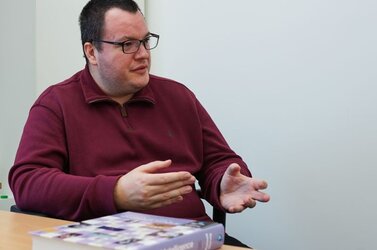
The European Commission wants to create a uniform legal framework for Artificial Intelligence (AI) within the EU through its proposed regulation published in April 2021. To evaluate the proposal, the Committees for European Union Affairs of the German Bundestag and the French National Assembly held a joint meeting on 6 May. Prof Dr Patrick Glauner from the Deggendorf Institute of Technology (DIT) was invited as an expert.
“I explained to the MPs why, in my opinion, AI should not be regulated by its own legislation,” said Prof Glauner, who is also deputy head of the Bavarian regional group in the AI Feder Association. Today, safety-critical use cases are already covered by existing regulations, laws, standards and norms in almost all cases, Glauner continued: “The proposed regulation threatens overregulation, which would make the use or development of AI in the EU significantly more difficult or even impossible.” The DIT professor also called for a High-Tech Agenda Europe based on the High-Tech Agenda Bavaria. This would bring the added values of AI for citizen to more attention and take measures to increase competition. DIT President Prof Dr Peter Sperber proudly emphasises: “The fact that two national parliaments are interested in DIT’s AI expertise impressively proves that we are leading in the field of research and teaching on AI.” The new insights on AI regulation from the committee meeting would also be directly incorporated into teaching at DIT. Prof Glauner’s full written statement is freely available at www.glauner.info/expert-evidence. If you have any questions about the potential impact of the planned EU-wide AI regulation, Prof Glauner is also available as a direct contact at patrick.glauner@th-deg.de or +49 991 3615 453.
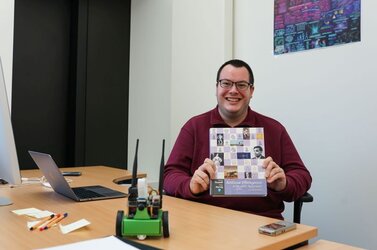
The Deggendorf Institute of Technology (DIT) starts the first English-language technical Bachelor's degree programme in Deggendorf: Artificial Intelligence. Prospective students will be able to study Artificial Intelligence (AI) in English as early as October 2021.
One of the world's first Bachelor's degree programmes in Artificial Intelligence has been available at DIT since 2019. Artificial intelligence makes it possible to automate human decision-making behaviour and will change almost every industry in the coming years and decades. The demand for AI experts on the market is correspondingly high. The future programme coordinator Prof. Dr. Patrick Glauner describes AI as the next step in the industrial revolution. This means excellent career prospects for the students. With the new degree programme, the university wants to take this and the advancing internationalisation of the German labour market into account. Above all in Europe, Germany-wide and regionally, the university hopes to interest more young people in studying AI in Deggendorf. Both, lectures and exams, are held in English. A great advantage is the possibility to attend the first two semesters, both in Deggendorf and virtually. Minister of Science Bernd Sibler emphasises: "Being future-oriented and international are among the hallmarks of the Deggendorf Institute of Technology. Its future offer of an English-language degree programme in ‘Artificial Intelligence’ proves this once again. After all, artificial intelligence is the key technology for diverse new developments worldwide." The degree programme offers over ten modules on AI, providing a broad and in-depth education. Computer science basics are not neglected. Spread throughout the degree, eleven core computer science modules form the backbone of the programme. A highlight of the degree programme is the practical semester, which is scheduled for the fifth semester, in which students apply their knowledge in practice in companies and thereby deepen it. However, the acquisition of key competences and soft skills, for which suitable modules are included, is also important for later professional life. Foreign students also learn the basics of the German language necessary for a successful professional life during their studies. More information on the AI degree programme can be found on the DIT website: https://www.th-deg.de/ain-b-en. Applications for a place on the programme can be submitted from Thursday, 15 April. If you have any questions about the degree programme, Professor Glauner can also be contacted directly at patrick.glauner@th-deg.de or +49 991 3615 453.

In February, the Deggendorf Institute of Technology (DIT) became a member of the Sicherheitsnetzwerk München e.V. The reason for this is not just information security. It is also about networking, design and maximum competitiveness in the future.
“Nowadays, data security is an indispensable factor in protecting institutions as well as companies against the countless digital threats,” says Prof Dr Helena Liebelt, Head of IT at DIT: “However, it’s about more than that,” Liebelt adds. Cyber security means competitiveness. But in order to be successful in a digital future, networking and cooperation are other important cornerstones of the strategic orientation.
Numerous well-known companies such as Airbus, Audi, Intel, Siemens and Huawei are members of the Munich Security Network. But also teaching and research institutions. For example, the Technical University of Munich, the University of the Federal Armed Forces and Fraunhofer AISEC. “For us, this is a wonderful opportunity to keep an eye on scientific developments on the one hand, but also on the latest state of industrial technology on the other,” says Prof Liebelt. Together with important industry giants and other outstanding research institutions, DIT wants to actively shape further development in the field of cyber security. Not least, a new technology campus on this topic is currently being built in Vilshofen. Liebelt cites as a special privilege of membership in the Munich Security Network the opportunity to participate in the annual “Munich Cyber Security Conference” (MCSC), which always takes place one day before the Munich Security Conference: “This is a real fixture in the cyber security industry.” DIT will be there in the future.
Further information: https://it-security-munich.net

One reason why more companies have not yet fully switched to electric mobility or do not offer charging stations is the concern about significant additional costs in terms of electricity consumption. Companies usually have a contractually agreed annual maximum load. If this is exceeded, depending on the size of the company, surcharges of up to several hundred thousand euros on the unforeseen load peak can be the result. The parking and charging management system “SmiLE” will soon provide a solution to this problem. Scientists at the Deggendorf Institute of Technology (DIT) are developing the system.
Prof Dr Andreas Berl is responsible for the project and knows the explosive nature of the topic. The problem for companies is uncontrolled charging. The feared additional costs caused by peak electricity consumption are quickly reached. A load peak is when the average energy consumption in an interval of 15 minutes exceeds the maximum contractually agreed upon with the electricity provider. There are many reasons why a load peak occurs. According to Prof Berl, this is the case when charging processes are started immediately with maximum power and batteries are unnecessarily “fully” charged. When charging processes are unscheduled, without enquiring about the next use of the vehicle. Or if the charging processes are not coordinated with the rest of the company’s energy system (e.g. load management).
In order to solve these problems, the research group led by Prof Berl is developing the SmiLE parking and charging management system. The goal is to bring more companies to e-mobility. The system is connected to the company’s existing energy system. SmiLE also makes it possible to reserve a parking or charging option so that the e-vehicles are charged according to the reservation details. In addition, a company’s own vehicle fleet can be integrated into the charging management. With the help of AI-supported forecasting methods, the charging processes can be planned in such a way that no expensive peak loads occur. To this end, DIT is developing and implementing algorithms for optimal charge planning and forecasting models. In addition, the charging planning is to be optimised according to the entrepreneurial goals. Exampled of this are the maximum use of renewable energies, the extension of the service life of vehicle batteries and stationary energy storage or the minimisation of charging costs.
To identify the respective requirements, the many years of experience of E-WALD GmbH, one of the largest German charging infrastructure operators, and eeMobility GmbH, which operates charging infrastructure for companies throughout Germany, are of great importance. Seamless communication between the respective system components and in particular the connection between the SmiLE system and the charging stations is the focus of eeMobility GmbH in the project. The SmiLE project (No. AZ-1405-19) is funded by the Bavarian Research Foundation. The project started in May 2020 and ends in 2023.
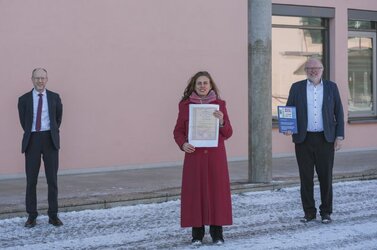
The Deggendorf Institute of Technology (DIT) has maintained a partnership with Politehnica University Bucharest in Romania since 2012. The partnership came about through Erasmus+, a European Union programme for education, youth and sport. DIT staff member Monica Ciolacu has now completed the first cooperative doctorate with Politehnica Bucharest University and DIT.
Her dissertation "An adaptive framework for computer-based learning technology" deals with the use of artificial intelligence in teaching. Adaptive and personalised learning is to promote student performance. In addition, lecturers are to be relieved of routine work. She defended her doctoral thesis before Prof. Dr. h.c. Ing Paul Svasta (UPB), Prof. Dr. Cezar Ionescu (THD), Prof. Dr. h.c. Ing Dan Stoichescu (UPB) and Prof. Dr Ing Alexandru Serbanescu (Military Technical Academy Bucharest). The results of their work have already attracted attention at several conferences. In April, the next conference will take place virtually: the Global Engineering Education Conference, organised by the FH Kärnten and the Vienna-based FH Technikum. The theme is "Women in Engineering".
Doctoral students and those interested in doing a doctorate are advised and supported at DIT’s Graduate Centre. The International Office provides advice on the opportunities offered by the Erasmus+ programme, which, in addition to study and internship stays for students, also enables doctorates or the mobility of university staff.
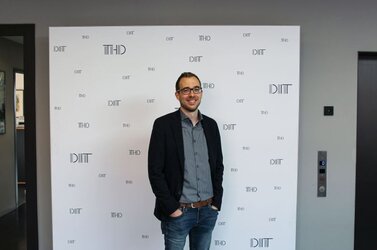
The computer scientists at the Deggendorf Institute of Technology (DIT) are gaining another professor. Dr Phillipp Torkler will take over the professorship for Bioinformatics and Data Analysis at DIT in the summer semester of 2021. As a member of the university’s youngest faculty, he will teach in the “Life Science Informatics” degree programme. Professionally, he has been involved in the development of molecular diagnostic tests for personalised therapies for cancer and other serious diseases.
Phillipp Torkler could be described as a bioinformatician through and through. From his bachelor’s degree to his doctorate, his academic training was focused on this field. He explains that one goal of bioinformatics is to develop methods and software for analysing and managing high-dimensional, biological data so that it can be used at all. Biomarkers, for example, can be used for the early detection of cancer. He himself researched an early detection test for prostate cancer for a young US start-up, with success. A large biotechnology company became aware of the start-up and took it over in the summer of 2018.
The next step for Phillipp Torkler is now the professorship in Deggendorf. Curiosity and the conviction that research and development make life better, is what makes him pursue his passion. He chose DIT because it is a steadily growing university that is gradually developing attractive and modern fields of study and is a major driving force for the entire region. At DIT, he has the exciting challenge of being able to help shape the fairly new degree programme “Life Science Informatics” at an early stage and thus lay the foundation for the specialisations bioinformatics and data analysis in the field of life science and biotechnology as part of the team.
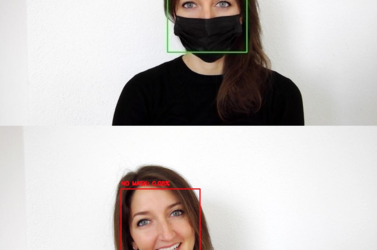
Stefanie Beck is Managing Director at the management consultancy Fuhrmann Leadership in Karlsruhe. She is doing her Bachelor’s degree in Artificial Intelligence (AI) at the Deggendorf Institute of Technology (DIT) while working. Together with fellow students Johannes Artmeier, Lucas Fobian and Andreas Neuhierl, Beck has now developed an AI that recognises in a video stream in real time whether a person is wearing a mask or not. The research field in which Beck is working is highly regarded. It is called “computer vision”.
DIT students summarise their project as follows: “Face masks are not only necessary in pandemic situations, but above all in everyday professional life. In industry or medicine, for example. Our application ensures that the prescribed mask is worn when entering a protected space.” Such project work offers students at DIT the opportunity to apply their knowledge to practical examples. Graduates in the field of AI are highly sought after by companies. This is particularly true for the field of “image understanding”, as “computer vision” is also known. It enables computers to automatically recognise correlations in images and videos and draw appropriate conclusions. Other examples of such applications are optical inspections in manufacturing processes, object recognition in autonomous vehicles or smartphone apps that recognise faces in photos.
Since October 2020, DIT has been offering the new course “Computer Vision”, thus preparing its students for a corresponding professional career. “In the first third, our course offers an intensive introduction to the most important and, above all, practically relevant basics of the subject area,” says lecturer Prof Dr Patrick Glauner. The AI expert also explains how DIT sets itself apart from other regional and national course offerings: “I looked at what course content top international universities like the Massachusetts Institute of Technology (MIT), Stanford or Imperial College London teach.” Glauner has integrated similar content into the DIT course. At the same level and presented in an understandable way. “Even at the top institutes, in the end they only boil with water,” says the DIT professor, who is himself an alumnus of Imperial College London.
Pure theoreticians, however, are hardly in demand on the job market. What is needed is expertise in the practical implementation of image understanding applications. That’s why the students spend the rest of the semester working in groups on projects of their own choosing and applying the knowledge they have acquired in a concrete way. “Very extensive and high-quality results have emerged, which clearly show how excellently our students are positioned in international comparison,” Prof Glauner proudly reports.
In addition to Beck’s results, Glauner points to another example. Course participants Patrick Gawron and Achot Terterian developed a coin counter together. Based on a mobile phone photo, it calculates the amount of money in the purse or piggy bank that has just been emptied. “In the process, we learned how to segment coins and other objects from photos and recognise them using a neural network,” Gawron and Terterian report.
DIT has been offering Germany’s first Bachelor’s degree programme in “Artificial Intelligence” for two years. The first cohort will graduate in summer 2021. Interested students can also attend selected AI lectures and get a taste of university life at DIT again from March 2021 as part of the early study programme. If you have any questions about image understanding, AI and the degree programme, Prof Glauner can also be contacted directly at patrick.glauner@th-deg.de or +49 991 3615-453 at any time.
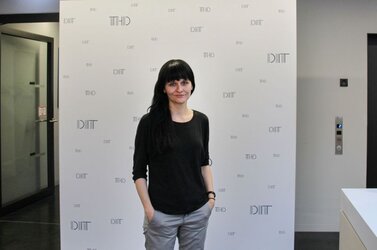
How does learning go digital and with the help of artificial intelligence (AI)? Dr Christina Bauer, new professor at the Deggendorf Institute of Technology (DIT), knows the answer. As a specialist for Artificial Intelligence and Digital Teaching, she will develop and evaluate digital learning environments that react intelligently to users.
In recent months, digital teaching has suddenly moved into the spotlight thanks to Corona. This is an opportunity for society to continue dealing with it now, if Christina Bauer has her way. The AI and also digital teaching could support here! For example, one could provide the broad masses with simple information on socially important topics and individualise it. With regard to teaching, courses with the help of artificial intelligence can be much better tailored to the needs of learners. Either to supplement classroom teaching or to offer courses completely digitally. DIT will take this step in the long run. To this end, Christina Bauer will test, research and teach the use of artificial intelligence in digital teaching. Intelligent learning environments will be designed and investigated, e.g. in the form of intelligent tutorial systems or assessment systems. She has already set herself the goal of firmly anchoring digital teaching at DIT even after Corona: “And this as an important supplement to presence teaching, so-called blended learning.
Christina Bauer gained her experience primarily at the University of Regensburg. During her doctorate and later in projects as well as in teaching and as coordinator of the newly introduced Master’s programme Digital Humanities. She herself studied information science. In Deggendorf, she will work as a lecturer primarily at the Faculty of Applied Computer Science. In teaching, it is important to her to work in a structured way. She also likes to encourage and support students with her own ideas. She hopes to find like-minded people among the scientists when it comes to sharing knowledge. In her spare time, the young professor is involved in Scientists for Future. Scientists actively contribute the current state of their research field in a comprehensible form to the social debate on sustainability and securing the future.

On 21 October, the joint Business Information Technology Symposium of the Deggendorf Institute of Technology (DIT) and the OTH Regensburg will take place as an online event. The event with the focus on “Process Analytics” will be organised by the professors Dr Stephan Scheuerer (DIT) and Dr-Ing Frank Herrmann (OTH).
In accordance with the motto “from practice and science for practice”, speakers from renowned companies will give relevant specialist lectures. The topics will be “Production planning in the factory of the future” (The Boston Consulting Group GmbH), “Data-driven digitalisation of customer processes” (Conrad SE), “Optimisation of the allocation of tool magazines” (Siemens AG) and “Minimisation of set-up times through the use of simulation and optimisation (Maschinenfabrik Reinhausen GmbH). Participation in the event is free of charge, but formal registration is required. Further information is available at www.oth-regensburg.de/digitalisierung.
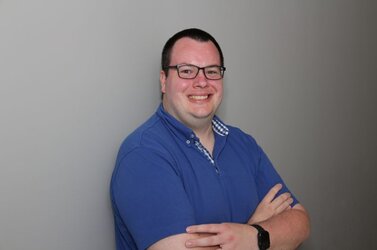
Almost every day we hear about new breakthroughs in research and development on artificial intelligence (AI). The exciting question is and remains, however, what about their implementation in companies? A four-day block event was held for the first time in September 2020 at the Deggendorf Institute of Technology (DIT). The students first learned about the basics of AI innovation management and then tested in case studies the identification of AI potential and the introduction of AI in companies. This course is probably unique, not only in Germany. It was led by Prof Dr Patrick Glauner.
Various studies conclude that currently about 80 percent of AI developments in companies do not yet create financial value or do not lead to marketable product or services. “There are many reasons for this,” explains Glauner. “One of the reasons is that classical AI teaching often only deals with purely technical aspects and ignores business management aspects”. The AI bachelor’s programme at DIT therefore offers a globally unique course on “AI Innovation Management” in addition to numerous technical courses. “By this we close this gap. We teach students what the typical challenges in companies are when introducing AI and how these challenges can be solved,” reports Glauner.
Course participant Ursula Pähler was impressed: “The course allowed me to draw parallels and differences to classical innovation management in other areas. This made me aware of the existing challenges, especially when introducing AI”. Ralf Minge, who is studying part-time, now feels much better equipped for the value-added implementation of AI in companies: “This course very impressively closes the gap between academic research on AI and its effective application in companies. I can now start directly with the value-adding implementation of AI”.
Since last year, DIT has been offering the Bachelor’s programme “Artificial Intelligence”. In October 2020, around 90 more young people will begin their studies. If you have any questions on topics related to innovation and AI, Prof Glauner can also be contacted directly at patrick.glauner@th-deg.de at any time.

The Deggendorf Institute of Technology (DIT) has been intensively promoting the use of digital teaching for years before the corona pandemic. This commitment has now been rewarded with a grant of € 182,000 for DIT projects from the Virtual University of Bavaria (vhb).
The digital courses offered via the SMART vhb platform gained in importance due to the cancellation of classroom teaching this summer semester. DIT already offers 28 vhb courses online, which were used by other universities of applied sciences, especially during the corona semester, and were applied in teaching. The notification of the vhb's support of € 182,000, which corresponds to 20% of the total funding of the latest SMART vhb funding round, will further expand DIT's digital teaching. Over the coming months, a total of ten courses will be developed and, from the 2021/2022 winter semester onwards, will be made available via the SMART vhb platform. The online courses range from the introduction to programming with Python, Java programming, programming concepts, computer science concepts, hardware design, foundations of informatics, AI applications and logic in artificial intelligence to engineering mechanics, dynamics and risk management. The development of these new SMART vhb projects is organised by Prof Dr Dr Heribert Popp, vhb representative of the unversity and project manager Dr-Ing Monica Ciolacu.
At DIT, the vhb representative, Prof Popp, has been substituting 50% of teaching in all his modules with digital teaching for 13 years now. In his digital course, he tested artificial intelligence (AI) methods by which digital teaching materials adapt to the level of knowledge of the students at the beginning of the course. Popp also uses an AI-based early warning system in his vhb courses, which sends a warning e-mail to students at risk. As a result, the failure rate could be almost halved.
The SMART vhb platform manages online learning units that can be flexibly integrated into the students' own teaching. These digital learning units start with the learning goals and are composed of different materials such as videos, text elements, self-tests or simulations.
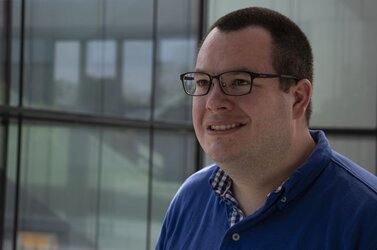
What exactly is Artificial Intelligence, also known as AI? In which way does AI influence our future, in Lower Bavaria, in the Bavarian Forest, or maybe even in Deggendorf. Prof Patrick Glauner from the Deggendorf Institute of Technology (DIT) can tell us more about it.
Scientists found out, primal fears are connected to AI: surveillance, enslavement, loss of uniqueness/exceptionalism, as well as the end of free will. "Exaggerated", that's what Prof Glauner calls it, when you're talking about the end of free will, just because people follow the algorithms through internet or media ads. People will not be replaced by robots in the near future. But somehow, artificial intelligence seems to have escaped from blockbuster movies, like the genie from the bottle. The movies that gave us goosbumpbs: The Matrix, Minority Report or the Fritz Lang classic Metropolis from 1927 - one of the most important pieces in film art history.
"We've been able to use AI for pattern recognition in radiological diagnostics. A great enrichment for our healthcare in oncology," said Glauner, referring to a prime example of beneficial AI developments. In addition to a whole range of other applications already available today, artificial intelligence could certainly one day include all the useful connections between the unmanageable scientific disciplines and make them visible and usable again. The polymath from antiquity no longer exists. What does a virologist even know about AI, what does a computer scientist know about viruses? Certainly not enough. And those who don't know anything must believe everything. The data is here. More than enough, big data in fact. And big data is the food for meaningful AI.
Patrick Glauner has been a professor for artificial intelligence since the age of 30. Previously, he worked at the European Organization for Nuclear Research (CERN) in Geneva and at Krones AG, among others. He has been working on artificial intelligence for ten years, most recently in particular on AI innovation management. In spring 2020 he published a book on this subject in cooperation with the Springer-Verlag: "Innovative Technologies for Market Leadership: Investing in the Future".

